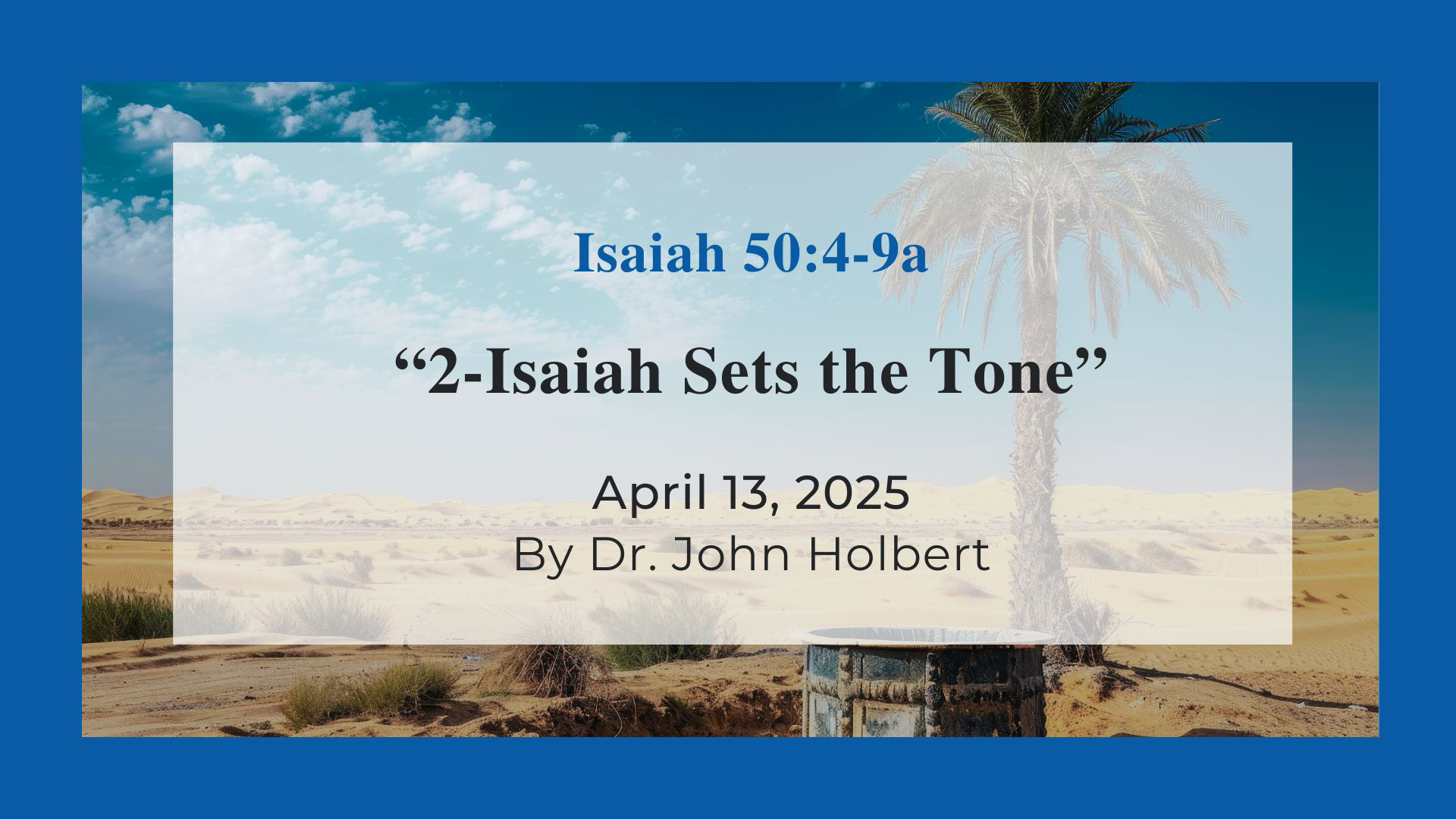2 Isaiah Sets the Tone - Reflections on Isaiah 50:4-9a, Passion Sunday, Year C
by John C. Holbert on Thursday, February 13, 2025

It would be difficult to overstate just how important the oracles of 2-Isaiah have been to the shape and tone of Christian theology. As Christianity grew and prospered around the Mediterranean basin in the early centuries after the crucifixion of Jesus, again and again writers and commentators, from the apostle Paul to the composers of the gospels to early church theologians, turned to the words of the prophet of the Israelite exile to undergird their reflections on the identity and mission of the one they called Messiah. The reasons for this significant employment of the Isaianic poetry are both obvious and at the same time somewhat mysterious.
Clearly, the passion of Jesus, his divine mission, his rejection at the hands of the religious authorities, his cruel murder, and the near-immediate belief in his resurrection from the dead, found ready echoes when the 6th century BCE prophet was mined by believing readers, anxious for corroboration of their emerging convictions concerning this Jesus of Nazareth. Most especially, the four so-called “servant songs,” scattered throughout the sixteen chapters of the prophet’s work, were well-crafted attestations for Christians of who they imagined Jesus to be and what they imagined he had come to do. This Passion Sunday, 2025, we are led to the third of those servant songs, in many respects a particularly crucial one for us, because it focuses its attention on the servant as both humiliated and vindicated by God, two facets of the perception of Jesus for the very earliest believers.
But, first, we should ask: just who does Isaiah imagine his “suffering servant” to be? And the answer to that question remains as elusive now as it has been for the preceding 2500 years! Many answers have been offered over the centuries—I happen to believe what the poet had in mind was a specific remnant of the exiles from Judah—but whatever Isaiah may have meant by his mysterious reference, it soon became certain to those earliest Christians that no one other than Jesus Messiah could possibly be the one intended by Isaiah’s creation. That, of course, assumes that the believers imagined that Isaiah had Jesus in mind some 500 years prior to his birth, no small leap of religious imagination, but a leap not so unusual in ancient interpretation. Modern commentators, among whom I count myself, do not for a moment think that Isaiah wrote his words with Jesus of Nazareth looming over his shoulder, but I can easily see how those ancient Christians found in the prophet’s servant language insights that illuminated for them the emerging portrait of their Messiah.
“Lord YHWH has given me a tongue of those who are taught” (Is.50:4a). The NRSV conjectures that the ending phrase should be “tongue of a teacher,” but the Hebrew will not sustain that reading. The servant, says Isaiah, has a tongue ready to speak, but just as ready to be taught. Surely, that describes Jesus to a tee—anxious to speak but often open to being taught. Remember his remarkable confrontation with the Canaanite woman who remonstrates with him when he insists that his mission is only to Jews; she disagrees, and for that teaching (“for saying that,” he says), her daughter is cured (Mk.7:24-30). The servant’s ability to be taught ensures that he “may (also) know how to sustain the weary with a word” (Is.50:4b).
“Lord YHWH has opened my ear, and I was not rebellious; I did not turn backward” (Is.50:5). Jesus remained steadfast in his mission, having been taught and sustained by God’s own word, as well as offering a divine word to others in need. In addition, Jesus was physically attacked but did not avoid that pain, giving his back to those who would strike, offering his cheeks to those who would pull out his beard, refusing to hide his face from shame and the disgust of spitting (Is.50:6).
“Lord YHWH helps me; that is why I have not been disgraced, and have set my face like flint; I know I shall not be put to shame,” not finally, not utterly (Is.50:7). And the reason for that grand optimism is made clear in Vss.8-9. “The one who vindicates me is nearby. Who can bring me to the court? Let us stand up together. Who thinks to master my justice; let them confront me! Look! Lord YHWH helps me; who in the world can make me guilty?” The servant will finally be vindicated, despite many who attack and disparage the servant as guilty.
In short, Jesus will, in the end, find vindication, just as Isaiah’s mysterious servant did. Jesus’ passion included abuse and scorn, physical attack and furious rage, leading to a monstrous death on a cross. But his resurrection, claimed the believers, announced to the world a final justice, a complete vindication of the Messiah. Little wonder that this servant song of Isaiah has served for centuries as a lodestone in the understanding of the final earthly days of Jesus. And little wonder on this Passion Sunday, 2025, we still read his ancient words as pointers toward the one we too name Messiah.
